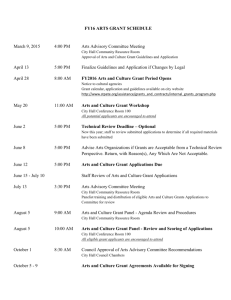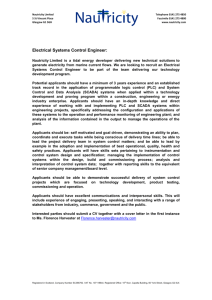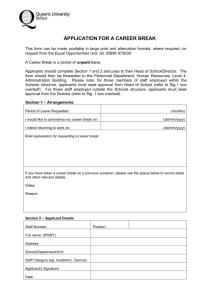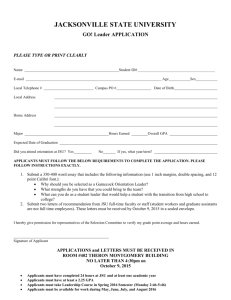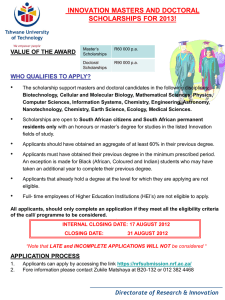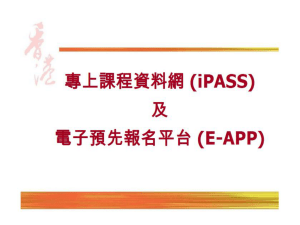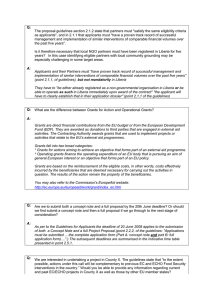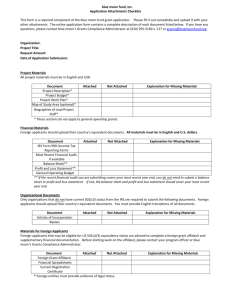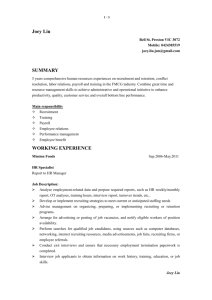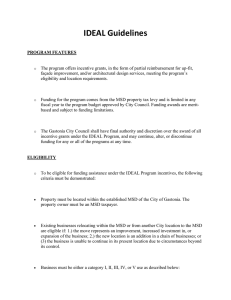Grant guidelines - Better practice checklist
advertisement
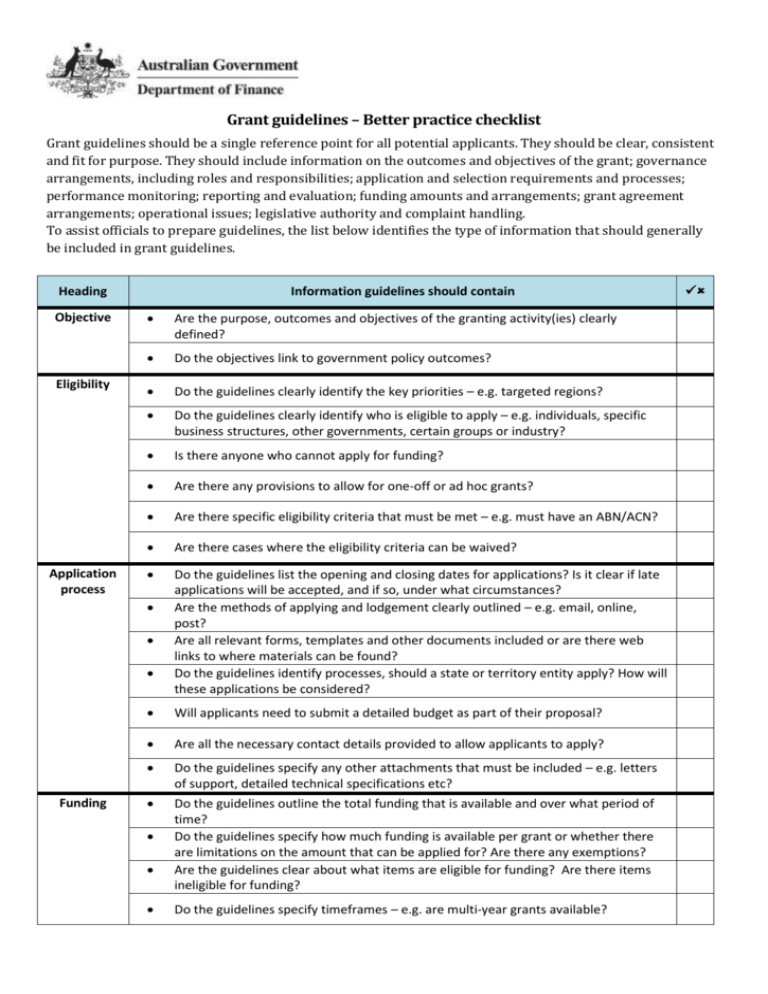
Grant guidelines – Better practice checklist Grant guidelines should be a single reference point for all potential applicants. They should be clear, consistent and fit for purpose. They should include information on the outcomes and objectives of the grant; governance arrangements, including roles and responsibilities; application and selection requirements and processes; performance monitoring; reporting and evaluation; funding amounts and arrangements; grant agreement arrangements; operational issues; legislative authority and complaint handling. To assist officials to prepare guidelines, the list below identifies the type of information that should generally be included in grant guidelines. Heading Objective Eligibility Application process Information guidelines should contain Are the purpose, outcomes and objectives of the granting activity(ies) clearly defined? Do the objectives link to government policy outcomes? Do the guidelines clearly identify the key priorities – e.g. targeted regions? Do the guidelines clearly identify who is eligible to apply – e.g. individuals, specific business structures, other governments, certain groups or industry? Is there anyone who cannot apply for funding? Are there any provisions to allow for one-off or ad hoc grants? Are there specific eligibility criteria that must be met – e.g. must have an ABN/ACN? Are there cases where the eligibility criteria can be waived? Do the guidelines list the opening and closing dates for applications? Is it clear if late applications will be accepted, and if so, under what circumstances? Are the methods of applying and lodgement clearly outlined – e.g. email, online, post? Are all relevant forms, templates and other documents included or are there web links to where materials can be found? Do the guidelines identify processes, should a state or territory entity apply? How will these applications be considered? Funding Will applicants need to submit a detailed budget as part of their proposal? Are all the necessary contact details provided to allow applicants to apply? Do the guidelines specify any other attachments that must be included – e.g. letters of support, detailed technical specifications etc? Do the guidelines outline the total funding that is available and over what period of time? Do the guidelines specify how much funding is available per grant or whether there are limitations on the amount that can be applied for? Are there any exemptions? Are the guidelines clear about what items are eligible for funding? Are there items ineligible for funding? Do the guidelines specify timeframes – e.g. are multi-year grants available? Heading Grant agreement Information guidelines should contain Selection process Decision making Other Do the guidelines discuss any relevant tax implications – e.g. whether goods and services tax applies? What are the terms and conditions that recipients would need to comply with – e.g. is there an example grant agreement? Will the terms and conditions be varied for different types of organisations, such as state government entities? What are the record keeping, reporting and acquittal requirements that recipients would need to comply with? How will the grant be monitored? Are there any performance reporting requirements recipients would need to comply with? Will there be milestone payments? What is the process where recipients fail to meet obligations? Do the guidelines clearly outline the selection process – e.g. open competitive, targeted, open or closed non-competitive, demand-driven selection (See CGRGs para 13.11)? Do the guidelines detail the selection criteria against which eligible applications will be assessed? Do the guidelines specify what applicants need to address for each of the selection criteria? Do word limits apply? Do the guidelines detail the weighting attached to each selection criterion? Do applicants have to successfully address all selection criteria? Do the guidelines state how value with relevant money considerations will be taken into account in the awarding of grants? Is an external advisory panel used to provide input? If so, which and what type of bodies or industries are on it? Are the roles and responsibilities of all parties clearly defined? What roles do the entity and minister have? What role do external experts have? Is the assessment made by a panel? If so, who comprises the panel? Do the guidelines discuss conflict of interest, bias and associated obligations on officials and applicants, and how these will be managed? Do the guidelines identify who will make recommendations – e.g. officials, independent subject matter experts? Who will be the ultimate decision maker – e.g. the minister, accountable authority or a delegate? How will the successful and unsuccessful applicants be advised? What are the feedback and complaint handling mechanisms? Do the guidelines set out the avenues of appeal? Do the guidelines discuss how the grant activity or grant programme will be evaluated? Do the guidelines discuss the Privacy Act 1988 and associated obligations on officials and applicants? Are programme specific issues, such as the provision of equipment or premises by the Commonwealth clearly explained? Do the guidelines set out any additional requirements, such as relevant qualifications for grant recipient staff or applicable legislation?
